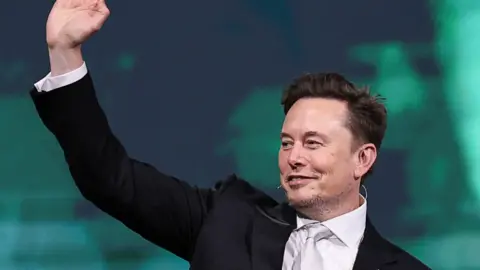In a significant shift regarding his political engagement, Elon Musk, the billionaire entrepreneur and CEO of Tesla and SpaceX, has publicly stated his intention to reduce his political spending in the coming years. This announcement comes in the wake of his substantial contributions during the 2024 election cycle, where he emerged as a prominent donor to President Donald Trump, spending upwards of $250 million (£187 million) to support the campaign. At a recent economic conference in Qatar, Musk expressed his plans to scale back, signifying a potential pivot away from the overt political activism that had characterized his recent years.
Musk’s remarks reflect a growing sense of caution and introspection regarding the role of significant financial contributions in political landscapes. He indicated that he expects to do “a lot less” spending in the future, and when questioned about whether he would continue to support political endeavors at previous levels, he noted that he felt he had “done enough.” His clarification that he will only engage in political spending if he perceives a compelling reason to do so suggests a shift in his priorities, especially as he now intends to focus on leading Tesla for the next five years.
The timing of Musk’s comments is notable, particularly following his earlier announcement about stepping back from his role in leading a controversial White House initiative known as Doge, aimed at substantially cutting federal spending. This retreat from direct political involvement comes against the backdrop of mixed results from his prior commitments, which included significant influence within the Trump administration and interactions that raised ethical concerns regarding conflict of interest. Several of Musk’s businesses have ongoing contracts with the federal government, leading to apprehension about the implications of his political expenditures.
Despite his high-profile political spending, public sentiment appears to have shifted negatively towards Musk. Recent electoral losses faced by candidates he backed, including a failed bid for a position on the Wisconsin Supreme Court despite spending over $20 million, illustrate the limits of his political influence. Furthermore, his association with controversial policies and significant spending cuts has led to boycotts and protests, particularly aimed at Tesla. This backlash, combined with declining sales and investor concerns over his focus on Tesla, has created additional pressures on Musk to recalibrate his approach.
However, Musk is adamant that the political backlash has personally affected him but is resolute in his belief that he made the right decisions during that period. He insists that Tesla remains strong, especially outside of Europe, and argues that the company’s recent contractual performance and demand illustrate its resilience. During his discussion at the conference, Musk defended the actions taken under the Doge initiative, asserting that the group’s role was primarily advisory and that they were performing well despite the challenges faced.
This public reassessment of his political role comes on the heels of his promotional activities where Musk previously championed policies under Trump—such as tariffs and spending cuts—that contradicted his business interests. While he remains a central figure in various industries, including electric vehicles and aerospace, his willingness to disengage from political sponsorship indicates a possible shift towards prioritizing corporate stability over personal electoral ambitions.
As Musk positions himself for the future, it appears he is drawing lines between his business endeavors and political affiliations that might previously have been more interconnected. His recent experiences and public perception challenges may very well lead to a new chapter for both him and his companies as he navigates the complexities of political influence juxtaposed against corporate responsibilities.



